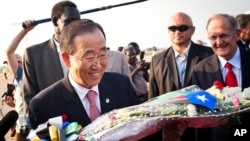The United Nations Security Council on Friday unanimously approved a new peacekeeping force for South Sudan, which marks its independence on Saturday.
During a brief meeting, representatives of all 15 members of the Security Council raised their hands in favor of a resolution establishing the new peacekeeping force for the world’s newest nation, South Sudan. Council president Peter Wittig of Germany announced the results.
“The result of the voting is as follows: the draft resolution received 15 votes in favor. The draft resolution has been adopted unanimously as Resolution 1996,” he said.
The new peacekeeping force, called the United Nations Mission in the Republic of South Sudan or UNMISS, will have up to 7,000 troops and up to 900 civilian police. Its mandate is to consolidate peace and security and to help establish the conditions for development in the Republic of South Sudan. The council approved the peacekeeping force for one year, but called for reviews in three months and six months to see if the troop level can be reduced from 7,000 to 6,000.
The Security Council resolution calls on the peacekeepers to monitor, investigate, verify and report regularly on human rights and potential threats against the civilian population. It also urges the peacekeepers to support the South Sudan government by deterring violence.
Security Council president Wittig called the approval of the peacekeeping force a strong signal of support for the new South Sudan.
“The council settled on a sizeable force and believes that this will help the necessities and the challenges of this new state of South Sudan," he said.
|
South Sudan At A Glance:
|
South Sudan’s independence follows a 21-year civil war in Sudan that ended in 2005. Early this year, voters in southern Sudan overwhelmingly approved separating from northern Sudan.
There are continuing sources of conflict, including fighting in the Sudanese-controlled area of South Kordofan and a flashpoint in the border area of Abyei. Troops from Sudan raided the area several weeks ago, forcing out thousands of southerners.
However, last month, Sudan and South Sudan reached agreement on the status of the disputed border region and called for its demilitarization. U.N. Secretary-General Ban Ki-moon, during a visit to Khartoum, Sudan, said that as the U.N. prepares to deploy Ethiopian troops to Abyei, the parties must make the political compromises necessary to finally resolve this question.
Mr. Ban will be in Juba, South Sudan, for the independence ceremony. He told reporters in Khartoum that he had urged the Sudanese government “one last time” to extend the mandate of the U.N. Mission in Sudan, which expires Saturday. The Sudanese government wants the troops out. The secretary-general wants them to stay, at least, he said, until the situation calms down.
Council president Wittig has said he expects quick approval of United Nations membership for South Sudan, once it formally becomes independent. A vote in favor by the U.N. General Assembly would make South Sudan the 193rd member of the United Nations.




